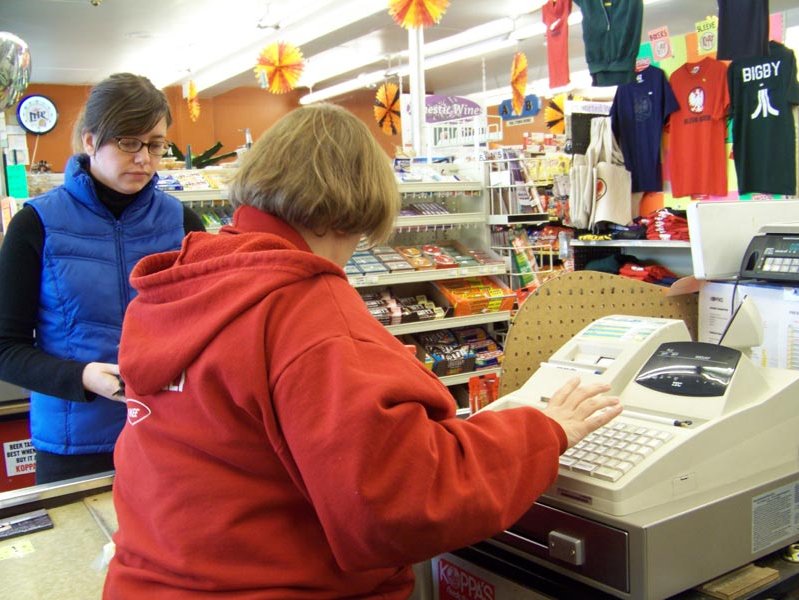Every month, The Supplemental Nutrition Assistance Program (SNAP) -- formerly called the Food Stamps Program -- helps more than 10 million households buy groceries.
In Wisconsin, SNAP is called FoodShare Wisconsin, and in Milwaukee, about 148,000 people benefit from it every month.
"Recently, this number has increased greatly," says Sherrie Tussler, the executive director for the Hunger Task Force.
For decades, low-income people paid for their food with a ticket-like tender called "food stamps." Today, the stamps have been replaced with Quest cards, which allow people to swipe a plastic card embossed with the word "Quest" in the same machine used for debit and credit cards.
Quest cards can be used at participating retail food stores, farmers’ markets and community organizations. However, the Quest card is an optional form of tender -- like food stamps were -- and therefore, grocery stores are not required by law to accept it.
In Milwaukee, most retail grocery stores accept Quest cards, including Pick ‘N Save, Whole Foods, Outpost Natural Foods, Aldi, Trader Joe’s and Koppa’s Farwell Foods.
Many neighborhood corner stores accept Quest, along with the Women, Infants and Children Supplemental Nutrition Program (WIC), a program aimed at pregnant and breastfeeding mothers.
However, Sendik’s grocery stores do not accept Quest cards.
The Balistreri family owns eight of the locations: Elm Grove, Franklin, Germantown, Grafton, Greenfield, Mequon, Wauwatosa and Whitefish Bay. Chris Sargent, Sendik’s director of marketing and pricing, says they are working on making Quest cards an accepted form of payment, but he has no idea when it will happen.
"There’s some technical stuff required to accept (Quest cards)," he says. "Our IT guy is working on it."
John and Anne Nehring own the Sendik’s in Shorewood, along with Brookfield’s V. Richard’s and G. Groppi Food Market in Bay View. Quest cards are not accepted at any of these stores, either.
The Nehrings did not respond to OnMilwaukee.com’s phone calls.
"I think that all grocery stores in a state where food share assistance is provided should have to accept Quest and should have all their clerks trained how to use it," says Stacy, who receives aid from the FoodShare program and asked that her last name not be used.
Pete Schmidt, co-owner of Koppa’s, says he processes $25-$75 in Quest purchases every day and has never had any problems with the cards.
In order for a family of four to receive FoodShare benefits, they must net less than $2,238 per month. That's a net annual income of less thna $27,000.
Quest cards can be used to purchase fruit, vegetables, grains, meats, fish, poultry, dairy and plants or seeds that will grow into food. They cannot be used to buy non-food items, including medicine, pet food, toiletries, hot or prepared food (basically any food that can be consumed in the store) or household products.
"Sometimes people use it to buy chips and soda, but most of the time I see people buying chicken, potatoes, bread," says Schmidt.
SNAP helps mostly women (59 percent) and children (52 percent), and 35 percent of the families who receive benefits have at least one person working. Most of the time, people who qualify for assistance have low-paying jobs, receive welfare, are elderly or disabled, are students or are homeless.
Stacy and her family qualified for FoodShare benefits after she started a business a few years ago.
"I am not ashamed to need food share assistance because it helps me get by while starting my own business which in turn is about to create two full-time jobs for people in my community," says Stacy. "I believe there are many 'what comes around goes around' stories of families that need Quest and will in turn give back to their community in some way because they were allowed to continue to nourish themselves during hard times."
Stacy says her only complaint about the program is that sometimes store clerks are not trained to understand the FoodShare program, which causes embarrassment at the register.
A few months ago, Stacy tried use her Quest card at the Sendik’s on Downer Avenue and the checker had never seen one before, so he asked another clerk if they accepted Quest. The second clerk replied, "Nope."
"I was embarrassed," says Stacy. "The grocery store should at least tell each clerk that if someone tries to use Quest, politely and discretely inform them that it isn’t available at that store."
Stacy says she’s happy that the Outpost accepts Quest cards, but many of the clerks do not know how to process it. Although the manager is always informed about the program and shows the checker how to process a Quest payment, she tells the clerk to press the "food stamps" key on the register.
"Sometimes she says ‘food stamps’ quite loudly and that is a little embarrassing," says Stacy. "The button on their debit machine must still say ‘food stamps.’"
For anyone in need of food assistance, Tussler suggests they apply for FoodShare benefits via the Web either from their home or the library because it takes less time.
"This isn’t the ‘80s. People don’t have to wait in long lines in a 'bad' neighborhood anymore," says Tussler. "You can even take an online 'test' to see if you qualify."
Molly Snyder started writing and publishing her work at the age 10, when her community newspaper printed her poem, "The Unicorn.” Since then, she's expanded beyond the subject of mythical creatures and written in many different mediums but, nearest and dearest to her heart, thousands of articles for OnMilwaukee.
Molly is a regular contributor to FOX6 News and numerous radio stations as well as the co-host of "Dandelions: A Podcast For Women.” She's received five Milwaukee Press Club Awards, served as the Pfister Narrator and is the Wisconsin State Fair’s Celebrity Cream Puff Eating Champion of 2019.



